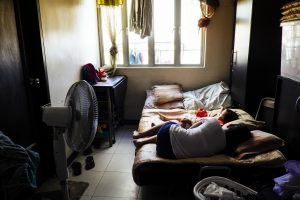On October 25, the Brazilian news outlet Globo released leaked videos of Marichu Mauro, the Philippine ambassador to Brazil, allegedly assaulting a domestic worker in the Philippines’ diplomatic residence. In a series of CCTV clips dating from March until September this year, a woman who looks to be Mauro is seen slapping, pinching and pulling the ear of the worker, now identified as Leonila de Ocampo, also a Filipino national. The Department of Foreign Affairs (DFA) has recalled Mauro to Manila and ordered an investigation into the incidents shown in the CCTV footage, stating that it “will not tolerate in any way whatsoever actions by any of its ranking officers or staff that go against our primary mandate, which is the promotion and protection of the welfare of all overseas Filipinos.” Mauro is a career diplomat who has held posts in Bahrain, Israel and Italy, as well as at the Philippine mission to the European Union in Brussels.
This is not the first time that a Filipino diplomat has been involved in the alleged mistreatment of household staff. In 2016, the DFA also recalled Lourdes Yparraguirre, its representative to the United Nations in New York, for charges including verbal abuse and non-payment for work performed by domestic staff. In 2008, similar accusations were leveled at Lauro Baja Jr., Yparraguirre’s predecessor at the U.N. mission.
In fact, the abuse and exploitation of domestic workers is a regular occurrence in diplomatic residences. In recent years, similar cases have occurred in the United States, Australia and Ireland, among many other nations. Brazil’s Labor Prosecutor’s Office (MPT) is currently investigating whether similar incidences may have happened with other employees in the Philippine embassy, which also hires Brazilians. The MPT has stated that it is not singling out the Philippines, and is also looking into the embassies and consulates of other nations. Due to diplomatic immunity, Mauro cannot be tried in Brazilian courts, but the news has provoked condemnation from labor movements in both the Philippines and Brazil.
Apart from responding to calls for justice, what is stake is not only the credibility of the DFA’s mandate to protect Filipino workers overseas, but the Philippines’ reputation as a leader in global migration governance. The country was at the forefront of the negotiations over the International Labor Organization’s Convention on Domestic Work (C189), which came into force in 2013. The treaty is the only global norm-setting mechanism that acknowledges the value of domestic work and recommends employment norms that most of us take for granted: a standard employment contract, wages received for work performed and regular days off, to name just a few. To date, the Philippines is also the only country that has ratified the treaty in the entire Asia-Pacific, where most of the world’s estimated 67 million domestic workers work and reside.
Ambassador Mauro’s alleged assault of her domestic worker, the footage of which was widely circulated by news outlets and on social media, not only threatens the good will and working relationships the Philippine diplomatic corps has developed over the years. It also compromises the credibility of the Philippines in following through on its third foreign policy pillar. The first two pillars are unexceptional, having to do with the country’s national and economic security. However, the third uniquely pledges the country’s resources toward protecting the rights and promoting the welfare and interests of Filipinos overseas.
This “third pillar” involves not just the foreign ministry but the Philippines’ migration bureaucracy as a whole. This is the same bureaucracy whose accumulated expertise has earned it authority among migrant-sending countries and international organizations alike. Countries such as Sri Lanka and Indonesia, and newer sending countries as far as Tajikistan, Ethiopia and Uganda, have sent delegations of technocrats to study and learn from the Filipino approach to the issue. For better or worse, the latter has evolved to deal with what can be contradictory mandates of seeking out labor export opportunities while seeking to safeguard the rights of migrant workers. How do you reconcile marketing and managing your workforce, such that they are seen as the preferable migrant labor option for receiving countries, and at the same time advocating for their rights?
This current crisis has brought this contradiction to the fore. The way the Philippines has chosen to handle this case also reflects these tensions. The DFA has put together a fact-finding team comprising of members of the Filipino diplomatic corps to investigate the case. At the same time, groups calling themselves the “DFA Career Officer Corps” and the “Retired Ambassadors Association” have expressed their “full support” for Mauro. As of writing, Foreign Secretary Teodoro Locsin, Jr. said he was not aware of the existence of such groups and claimed that the latter’s statement “does not, in any way, reflect the position of the Department nor the sentiment of its career corps.” Meanwhile, Brazil’s MPT presses on with its investigation of the alleged abuse and exploitation of a 26-year-old Filipina at the hands of Nadya Alhameli, a senior official at the Consulate General of the United Arab Emirates. Given the allegations against Ambassador Mauro, it is doubtful whether the Philippine mission in Brasilia can credibly defend the rights of its citizen in this case.
Dr. Liberty Chee is lecturer at the University of Groningen (Netherlands) who conducts research on migrant domestic work and international relations. She holds a PhD in Political Science from the National University of Singapore.































